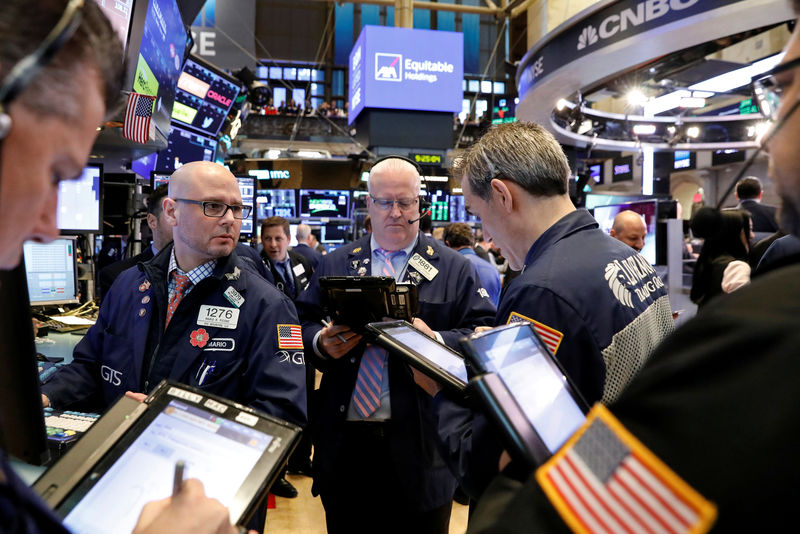By Laila Kearney
New York (Reuters) - Global stock markets tipped downward on Tuesday as Wall Street investors locked in recent gains while taking a cautious view of fresh U.S.-China comments even as European shares approached four-month peaks and China moved to further open up its economy.
U.S. President Donald Trump on Tuesday said he was not pleased with recent trade discussions with China, reversing optimism about a warming relationship between the world's two largest economies that led to a strong rally the prior session.
The Dow Jones Industrial Average (DJI) fell 177.3 points, or 0.71 percent, to 24,835.99, the S&P 500 (SPX) lost 8.38 points, or 0.31 percent, to 2,724.63 and the Nasdaq Composite (IXIC) dropped 15.58 points, or 0.21 percent, to 7,378.46.
Trump also said no deal had been made with ZTE (HK:0763) Corp (SZ:000063), as U.S. lawmakers from both political parties worked to block him from easing penalties on the Chinese telecoms gear maker.
The United States' change of tone on China chilled Wall Street investor sentiment, said Michael O'Rourke, chief market strategist at JonesTrading in Greenwich, Connecticut.
"It makes people less enthusiastic," O'Rourke said. "Investors are at a point where they're taking everything that is said tentatively, with a grain of salt."
Trump's remarks followed Beijing's announcement that it would steeply cut import tariffs for automobiles and car parts, leading to a rally in shares of U.S. auto makers Ford Motor Co (N:F), General Motors Co (N:GM), and U.S.-listed shares of Fiat (N:FCAU). (N)
Europe's big carmakers Volkswagen (DE:VOWG_p), BMW (DE:BMWG), Daimler (DE:DAIGn) also rose on the news. (EU)
Elsewhere, European shares were up as Italian government bond yields slipped from multi-month highs after six days of steep selling tied to the growing likelihood of a government comprised of the anti-establishment 5-Star Movement and the far-right League.
Analysts said the price falls of recent days might render the debt attractive again for some.
The pan-European FTSEurofirst 300 index (FTEU3) rose 0.29 percent and MSCI's gauge of stocks across the globe (MIWD00000PUS) gained 0.01 percent.
Meanwhile, oil prices rose on mounting supply concerns tied to Venezuelan crude output and a possible cut in Iranian exports that could further curb global supply.
The concerns were exacerbated when Washington added sanctions against Venezuela following President Nicolas Maduro's disputed re-election over the weekend.
Brent crude (LCOc1) futures rose 35 cents to settle at $79.57 a barrel, a 0.44 percent gain after recently topping the global benchmark of $80 for the first time since November 2014.
After six days of gains, the U.S. dollar retreated as Treasury yields dipped and investors sought incentives to buy after a 7 percent rally since mid-February.
The dollar's recent uptrend has been supported by generally upbeat U.S. economic data that has kept the Federal Reserve on track to raise interest rates at least two more times this year.
The dollar index (DXY) fell 0.11 percent, with the euro (EUR=) down 0.09 percent to $1.1779.
Gold steadied as the dollar lost momentum, but risk appetite in the broader financial market cooled the metal's gains.

U.S. gold futures